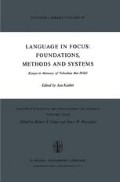Abstract
“Either the butler or the gardener did it. Therefore, if the butler didn’t do it, the gardener did.” This piece of reasoning - call it the direct argument - may seem tedious, but it is surely compelling. Yet if it is a valid inference, then the indicative conditional conclusion must be logically equivalent to the truth-functional material conditional,1 and this conclusion has consequences that are notoriously paradoxical. The problem is that if one accepts the validity of the intuitively reasonable direct argument from the material conditional to the ordinary indicative conditional, then one must accept as well the validity of many arguments that are intuitively absurd. Consider, for example, “the butler did it; therefore, if he didn’t, the gardener did.” The premiss of this argument entails the premiss of the direct argument, and their conclusions are the same. Therefore, if the direct argument is valid, so is this one. But this argument has no trace of intuitive plausibility. Or consider what may be inferred from the denial of a conditional. Surely I may deny that if the butler didn’t do it, the gardener did without affirming the butler’s guilt. Yet if the conditional is material, its negation entails the truth of its antecedent. It is easy to multiply paradoxes of the material conditional in this way - paradoxes that must be explained away by anyone who wants to defend the thesis that the direct argument is valid. Yet anyone who denies the validity of that argument must explain how an invalid argument can be as compelling as this one seems to be.
Access this chapter
Tax calculation will be finalised at checkout
Purchases are for personal use only
Preview
Unable to display preview. Download preview PDF.
Notes
David Lewis, Counterfactuals Harvard University Press, Cambridge, 1973, pp. 84–91 for a defense of realism about possible worlds.
Author information
Authors and Affiliations
Editor information
Editors and Affiliations
Rights and permissions
Copyright information
© 1976 D. Reidel Publishing Company, Dordrecht-Holland
About this chapter
Cite this chapter
Stalnaker, R.C. (1976). Indicative Conditionals. In: Kasher, A. (eds) Language in Focus: Foundations, Methods and Systems. Boston Studies in the Philosophy of Science, vol 43. Springer, Dordrecht. https://doi.org/10.1007/978-94-010-1876-0_11
Download citation
DOI: https://doi.org/10.1007/978-94-010-1876-0_11
Publisher Name: Springer, Dordrecht
Print ISBN: 978-90-277-0645-4
Online ISBN: 978-94-010-1876-0
eBook Packages: Springer Book Archive

